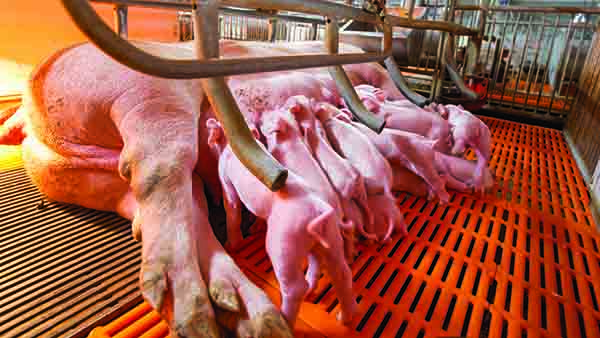The European Commission has confirmed that it will set out a legislative proposal by 2023 to prohibit cages for a number of farm animals, including farrowing crates for pigs.
The Commission has issued its response to the European Citizens’ Initiative (ECI), ‘End the Cage Age, which was supported by almost 1.4 million signatories from across the EU, after the European Parliament overwhelmingly gave its support earlier this month.
The Commission has committed to table, by the end of 2023, a legislative proposal to ‘phase out, and finally prohibit’, the use of cage systems for all animals mentioned in the Initiative.
This will include animals already covered by legislation – laying hens, sows and calves – and other animals mentioned in the ECI – rabbits, pullets, layer breeders, broiler breeders, quail, ducks and geese.
The ECI proposes cages are phased out by 2027 but the Commission has not committed to this.
Given that an end of the use of cages will require changes to current farming systems, the Commission will consider the socio-economic and environmental implications of the measures to be taken and the benefits to animal welfare in an impact assessment to be completed before the end of 2022. As part of this, a public consultation will be carried out at the latest by early 2022.
The Commission will assess the feasibility of working towards the proposed legislation entering into force from 2027.
The proposal will come as part of the ongoing revision of the animal welfare legislation under the Farm to Fork Strategy.
The Commission also made it clear that producers would receive support with the transition. In parallel to the legislation and to facilitate a ‘balanced and economically viable transition to cage-free farming’, the Commission said it would ‘seek specific supporting measures in key related policy areas, such as trade and research and innovation’.
The new Common Agricultural Policy will be used provide financial support and incentives help farmers upgrade to more animal-friendly facilities in line with the new standards, while member states will be able to draw from other funds to support farmers.
More ambitious
Agriculture Commissioner Janusz Wojciechowski said: “A sustainable food system cannot exist without high animal welfare standards. Thanks to our citizens, the Commission will be even more ambitious in this regard and phase out the use of cage systems for animal farms.
The Green Deal and its Farm to Fork Strategy, supported by the new Common Agricultural Policy, will be crucial in the transition to sustainable food systems. This citizens’ initiative only confirms that this transition also responds to a societal demand for more ethical and sustainable farming.”
Stella Kyriakides, Commissioner for Health and Food Safety, said: “Animals are sentient beings and we have a moral, societal responsibility to ensure that on-farm conditions for animals reflect this.
“Today’s response is a key step towards an ambitious revision of the animal welfare legislation in 2023, a priority since the beginning of my mandate. Our commitment is clear: the phasing out of cages for farm animals will be part of our actions under the Farm to Fork Strategy and lead to more sustainable farming and food systems.
“I am determined to ensure that the EU remains at the forefront of animal welfare on the global stage and that we deliver on societal expectations.”
Reaction
NPA senior policy adviser Rebecca Veale said: “The announcement from the European Commission isn’t unexpected but we’re conscious that the proposed timelines are fairly short; the suggestion that legislation could be brought in as early as 2027 is particularly worrying.
“As part of Copa we’ve been working with other farming unions across Europe to put together a collective position on the impact of the potential phasing out of farrowing crates. This is an important lobbying tool because it provides rationale and evidence for support and a long transition period.
“We’ve also been looking at this policy in the context of GB and it is apparent that if we were to move away from conventional farrowing crates, an appropriate transition period and support mechanisms are essential.
“Any change like this has the potential to export production from the UK – an outcome neither we, our members nor the British public, would see as a step forward given the high standards of animal health, welfare and food safety achieved by British producers.”
The RSPCA called on the UK and Welsh Governments to follow suit. RSPCA chief executive Chris Sherwood said: “This is a landmark day for European animal welfare – with the Commission supportive of this ECI, which paves the way for ending the use of cages in farm systems across the EU.
“We must now see the UK and Welsh Governments act too, to ensure we do not fall behind.”




